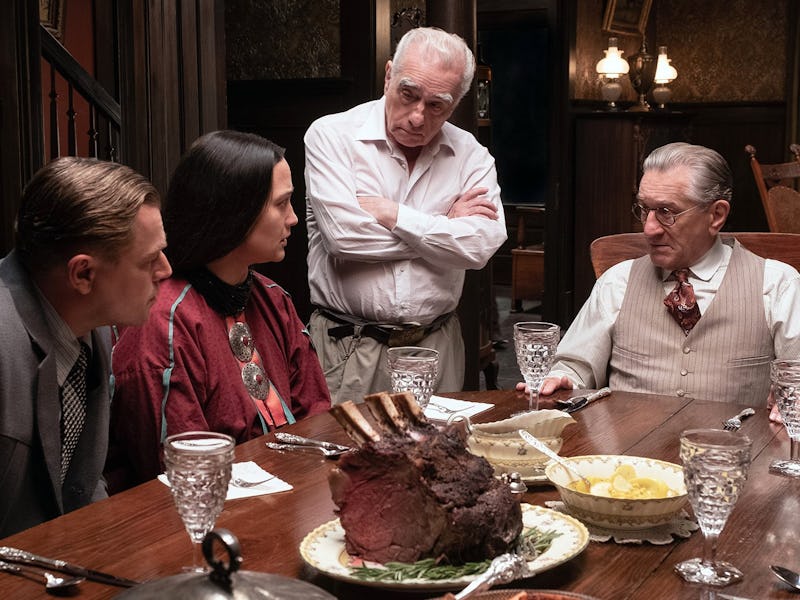Can American Blockbusters Succeed at Unpacking Our Dark History?
Two of the decades’ most epic films share a poignant message — but it’s going right over most people’s heads.

Hollywood loves a good film about a bad person. As eager as the industry is to produce those films, though — and as eager as audiences are to consume them — the point of those films is often lost on most viewers.
That dissonance is most apparent in the surprising reception to Martin Scorsese’s later works. The director of such debauched classics as The Departed and Goodfellas has long been synonymous with the glorification of crime and sympathetic American anti-heroes. It wasn’t until Scorsese’s latest three-film run (four, if you include Silence) that the industry finally began to see the director’s true intent. He’s not really here to glamorize gang wars or help us understand the plight of a charismatic mobster. His greatest films depict ganglands from a decidedly objective lens. That audiences admit to relating to these characters — and, in the most bewildering cases, sympathizing with them — speaks more to their bias than Scorsese’s own intentions.
The Dark Heart of Scorsese’s Movies
Killers is a tragedy in the skin of a crime thriller — but few seem ready to confront the dark message at its center.
With the Wolf of Wall Street, The Irishman, and last year’s Killers of the Flower Moon, Scorsese is exhuming America’s greatest vices. The protagonists of these films are not heroes; rather they are the personification of our history of greed, hubris, and bloodlust. That’s exemplified the best in Killers, Scorsese’s magnum opus. The director makes a conscious choice to tell this story from the perspective of its villains. We follow a loose gang of white supremacists as they eliminate every member of the Osage Nation standing between them and indiscriminate wealth. It’s a disgusting, disheartening story — and Scorsese forces us to live in every moment of it.
More than that, the director refuses to let audiences off without a real sense of complicity. Not only are we part of a legacy that involves colonialism, systemic murder, and ethnic cleansing; we’re complacent in a culture that either sanitizes these tragedies or erases them entirely. By stepping out from behind the camera in the film’s final moments to speak to us, the viewer, Scorsese is even holding himself accountable for his role in Hollywood’s dehumanizing machine. It’s one of the bravest statements he’s ever made, and it makes his past 40 years of films even more radical in hindsight.
Unfortunately, few seem ready to engage with the film on the level that it deserves.
From the first week of the film’s wide release, Killers has been subject to a slew of misinterpretation. Audiences were openly perplexed by Leonardo DiCaprio’s role as Ernest Burkhart, unable to reconcile his (objectively reprehensible) actions with his oafish guilt. “What is it in him we’re being asked to identify with?” asked Variety’s Owen Gleiberman — as if the answer isn’t already evident in his arc. He is complacent in his family’s bigotry and benefits directly from white supremacy, reluctant as he may occasionally seem. To feel sympathy for his character — and to continue to search for his humanity, even as he conspires in a genocide — is to reveal one’s own internal bias. That the movie got completely shut out of all the categories it got nominated for at this year’s Oscar ceremony just shows how audiences are not ready for Killers’ message.
Is Hollywood Capable of Deconstructing the White Savior?
Paul Atreides is not the hero of Dune — it’s Chani, who provides a moral foil to Paul’s ascension.
Maybe it boils down to a difference in perspective. Maybe white audiences are incapable of confronting their own internalized prejudice, or sympathizing with a character that doesn’t share their ethnic background. The same tonal disconnect abounds in one of the year’s biggest blockbusters: the second installment of Denis Villeneuve’s Dune. The director is adamant about deconstructing the white savior myth, in accordance with source material written by Frank Herbert.
As Paul Atreides (Timothée Chalamet) assumes his role as a fabled messiah and lords his influence over the Fremen, the indigenous people of the planet Arrakis, Villeneuve frames his takeover with a palpable sense of dread. It’s also met with clear disapproval by Paul’s scorned lover, Chani (Zendaya), who becomes the de facto hero of Villeneuve’s adaptation.
Whatever happens next in Paul’s ascension to Emperor, it won’t be pretty. And that’s entirely the point: we’re not really meant to root for him, but it is easier to sympathize with his corruption than it is with Ernest’s. Dune lays its story out as a proverbial tragedy — not just for its protagonist, but for the indigenous culture that will be manipulated by him. But that perspective has largely been ignored in most casual readings of Dune, setting the stage for a rude awakening if Villeneuve ever gets around to adapting Dune Messiah.
Instead, Dune: Part Two has become the poster child for the very trend Villeneuve and Herbert were trying to avoid. The internet has already reduced the film to one tone deaf meme after the next — particularly where Paul’s hypeman, Stilgar (Javier Bardem) is concerned. It’s a frustrating takeaway for a film that delivers such a clear treatise on colonization and systemic propaganda, but there’s a sense that the world isn’t ready to engage with blockbusters like these in good faith.
Films like Dune and Killers have a way of implicating Western viewers, and Hollywood at large, for its history of erasure and fetishization. Many viewers skirt past that responsibility by refusing to engage with their toughest themes, instead reducing their reactions to facetious, meme-ified sound bytes. It’s the very habit that Scorsese is trying to stamp out with Killer’s divisive ending — but it’s clearly going to take a more concerted effort, and a more willing audience, to progress the conversation in the right direction.